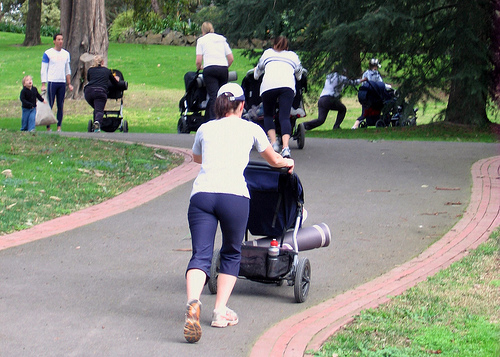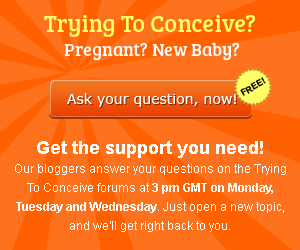Weight gain during pregnancy is healthy and normal. But after you give birth, you would like to fit into your pre-pregnancy clothes again as soon as possible, and to look great! Getting your body back after pregnancy usually involves weight loss as well as muscle toning. Here is our guide to healthy weight loss and looking great after pregnancy.

When can you start losing weight?
Pregnancy weight loss starts as soon as you go into labor. With the very birth of your baby, you will lose a lot of weight; your baby, placenta and the amniotic fluid all weigh considerable amounts. But when after pregnancy can you begin conscious weight loss efforts?
Women who are breastfeeding burn an average of 200 to 500 calories simply by nursing. It is never too early after birth to lose pregnancy weight by eating healthy and balanced meals either. But if you are planning intensive exercise and dieting, you will need to wait a little. It is generally recommended that women refrain from exercising until lochia (postpartum bleeding) has stopped. Your body will need time to recover from childbirth before you start working out.
It is especially important to take into account that the abdominal muscles separate during pregnancy to accomodate your growing baby. Women who start working out before the abdominal muscles recover from birth risk permanent diastasis recti (separated abdominal muscles). We recommend that you don’t exercise before your six-week postpartum checkup.
Good nutrition plays an crucial role in healthy weight loss after pregnancy, but breastfeeding mothers should be careful with diets. Dieting is fine for nursing moms, but they should wait until after their baby is around two months old – when their milk supply has been established properly, before serious weight loss after pregnancy.
Healthy weight loss after pregnancy – exercise and nutrition
Many new mothers are eager to lose weight after pregnancy, and think mainly of their postpartum belly when they say that. Although you may well be a little heavier then you were when you were still trying to conceive, you are also likely to be less fit and toned. What most mothers want from their body is both healthy weight loss after pregnancy and better muscle tone in the abdominal area.
Both of these goals require a combination of regular exercise and good nutrition, and women who want to know how to lose weight after pregnancy should take these things into account:
- Make sure that you eat regular meals and that you don’t skip any major food groups. Although the amount of calories that we consume does matter, the quality of your used calories is even more crucial.
- A pregnancy weight loss diet should be gradual, and your health should always be more important than shedding those pregnancy pounds.
- Weight loss without physical activity will not give you the muscle tone that you want.
- Finding time to work out can be tough with a newborn. Physical activity that was not specifically meant as a work out still counts! Try jogging with your baby, walking, or doing five-minute power work outs while your baby is sleeping.
Postpartum exercise routines
New mothers may well struggle to just find the time to exercise to lose weight after pregnancy! Fortunately, there are many solutions that can include your baby. It is best to incorporate both cardio exercises and strength training in your postpartum exercise routine.

One great form of exercise that is easily accessible to mothers looking after a baby is walking. Jogging may also be a possibility for you. Half an hour to an hour of jogging or walking is a wonderful start on the road to getting your pre-pregnancy body back. You can either have your baby in a stroller or a good hand-free baby carrier like a mei tai or Ergo baby carrier. And walking can take place outside, at the mall, or anywhere else.
You can also do short (five or ten minutes) work outs in your home while your baby is sleeping or your partner is holding the baby. While exercise equipment like a treadmill could come in handy, you can do ab crunches and pilates exercises with the help of internet exercise videos very easily, without having to buy special equipment.
You will probably find that your weaker areas are your abdomen and upper body, and that your legs are stronger. Therefore, weight loss post pregnancy and strength training after having a baby should focus on the upper body. Abdominal exercises can come in a wide variety and don’t have to be boring. But, you should build up slowly and build endurance.
Mom and baby exercise groups may be fun, but rarely help you achieve the post pregnancy weight loss you want. On the upside, many gyms are family-orientated and have free daycares where your baby will be safe while you work on getting your body back.
Going on a diet after pregnancy
For many, going on a diet after pregnancy is the obvious solution to weight loss post pregnancy. If you choose this route as well, you are best off taking a long-term view and a gradual approach.
A healthy and balanced diet should include proteins, vitamins and minerals, carbohydrates and grains. Calcium is something you should pay particular attention to. Avoid diets that exclude major food groups, and instead try eating healthy meals frequently, much like in the first trimester of pregnancy when you were suffering from morning sickness.
Keep up your blood sugar levels, and make sure that you stay well-hydrated. You can safely decrease the amount of calories you consume, but you should never compromise your health in doing so. The quality of calories is essential for women who are looking into weight loss after pregnancy.
Diet rules for breastfeeding mothers
Going on a starvation diet is not an option after pregnancy, particularly if you are breastfeeding. So, how to lose pregnancy weight in a healthy and responsible manner then? Dieting is fine, but there are some rules – just as weight loss and pregnancy don’t combine very well, but you can limit your weight gain through eating quality foods, breastfeeding has its own specifics.

Experts agree that nursing mothers need to consume at least 1500 to 1800 calories daily. If you are intending to lose pregnancy weight through dieting, it is best to wait until your baby is two months old. This gives your body time to establish the milk supply and avoids endangering your health.
You can healthily lose around six pounds of pregnancy weight a month while breastfeeding, which translates to 1.6 pounds each week. Low-carb diets and juice-only diets are definitely not suitable for breastfeeding mothers wondering how to lose pregnancy weight. And a gradual decrease in the calories you consume is much better than a sudden drop.
While severe dieting can lead to a decrease in breast milk, and can even halt lactation altogether, most dieting mothers who suddenly start dieting do not have to worry about their milk – it is their own health that is at stake, because the body makes breastfeeding a priority.
What women who are trying to lose weight after pregnancy should avoid
What should women who are going on a pregnancy weight loss diet, and those who are exercising to lose weight after pregnancy avoid? This is just as important to be aware of as knowing how to lose pregnancy weight. Here goes:
- Exercising before your body has recovered from childbirth. Pay attention to your abdominal muscles, which need time to move back together following pregnancy.
- Exercising before your doctor gives you the green light.
- Going on a post pregnancy weight loss diet that excludes any of the major food groups. Avoid fad diets and diet in a responsible manner instead.
- Making a sudden drop in calories. Decreasing calories should be a gradual process.
- Exercising too much, too soon. Postpartum exercise routines should be built up slowly, in accordance with your body’s capabilities.
In addition, weight loss in pregnancy to make it easier to get your body back after you give birth should also be avoided. Losing weight during pregnancy is rarely a good idea. You can avoid giving into those pregnancy cravings too often, and eat well during pregnancy though. Women who are not overweight during pregnancy will need to do less to lose weight after pregnancy.

